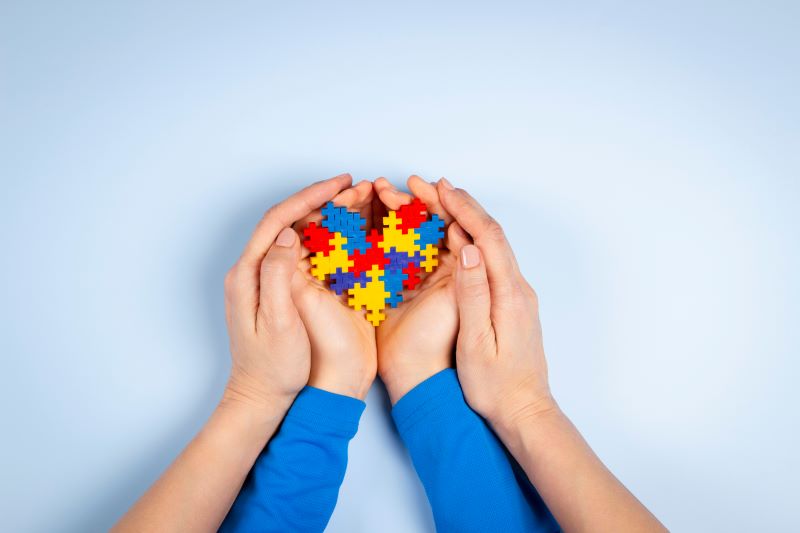- Education
- Health
- Parenting
My child was just diagnosed with autism. Now what?

In this article, you’ll find answers to questions like:
1. Who can help?
2. How to pick a school?
You may have had a feeling that something wasn't quite right when your toddler wasn't acting like other kids the same age. But receiving a formal diagnosis that your child has autism can be overwhelming. You may not know where to reach out for quality care for your child, and support for yourself. That's totally normal. It's good to know there is help locally each step of the way.
Randee Gabriel, programs manager for 211 Palm Beach/Treasure Coast, says parents can call 2-1-1 for a special needs advocate to help navigate the maze of social services and support networks available to young children with autism.
1. WHO CAN HELP?
The Els for Autism Foundation in Jupiter provides diagnostic services and early intervention for children as young as 16 months old who are at risk or who have received a diagnosis of autism spectrum disorder, says Marlene Sotelo, chief operating officer. “Our Spring into Action program includes parent and child classes, intensive one-to-one, classroom-based intervention based on applied behavior analysis, as well as speech and language therapy, occupational therapy and behavior therapy,” she says.
In fact, hundreds of service providers in Palm Beach County can help families, says Melissa DiNuzzo, former manager of field development for Autism Speaks. “From early intervention all the way up to employment services, we try to be the puzzle piece in the community to connect our families to the services they need,” she says.
And now's the time to meet other parents of children with disabilities, rather than isolating yourself or depending on the internet, Gabriel says. “Other families of children with disabilities are the only ones who really know how you feel. There are times they will be your lifeline and support you like no one else can,” she says.
Another great local resource is Florida Atlantic University’s Center for Autism and Related Disabilities (CARD), which provides free consultation, technical support training and resources to more than 5,200 families in five counties, director Maryellen Quinn-Lunny says.
2. HOW TO PICK A SCHOOL?
No one knows your child better than you, so your child’s education is an individualized decision, says Gabriel, of 211.
It’s crucial to know your legal rights to an educational plan that addresses children’s special needs. “Go to Individualized Education Plan (IEP) trainings when they are available,” Gabriel says. “Some children will have an IEP from age 3 through 22 years; some may never have one.”
The Els Center hosts two free public charter schools on its campus divided by age groups 3-14 and 14-22. The foundation also provides therapeutic arts and recreation, such as music therapy and golf. Sotelo, of The Els Center, suggests observing your child’s classroom and private therapy session before asking the teachers and therapists for tips to teach you how to infuse them into your family’s life.
SOURCES:
• Melissa DiNuzzo, former manager of field development, Autism Speaks
• Randee Gabriel, programs manager, 211 Palm Beach/Treasure Coast
• Maryellen Quinn-Lunny, director, Center for Autism and Related Disabilities at Florida Atlantic University
• Marlene Sotelo, chief operating officer, Els for Autism Foundation
You May Also Like
-
- Education
- Health
- Parenting
Tips for raising children with autism
If you have a child on the autism spectrum, this advice from a local expert may help. …
Read More -
- Education
- Health
- Parenting
Hey! Why can't my child do that yet? (and should I worry?)
Children develop at their own pace. But it's natural to wonder whether your child is progressing at a typical rate versus possibly developing a learning disability. Free screenings …
Read More -
- Health
- Other
- Parenting
Need a break? Reach out for range of help for special needs
If you're raising a child with special needs in Palm Beach County, read on for details on the many organizations that are here to help. From respite services to equipment, assistan …
Read More
Related resources
-
- Behavior
- Health
Autism Navigator
A collection of web-based tools and courses that uses extensive video footage to bridge the gap between science and community practice. The navigator was created by faculty and staff in the Autism Institute at the Florida State University College of Medicine. The website includes resources for families.
1-84-427-3457 Website -
- Education
- Health
- Parenting
Florida Atlantic University - Center for Autism and Related Disabilities
Free information, training and support based in Boca Raton for people with autism and related disabilities, as well as for their families and employers
561-213-5751 Website Email -
- Behavior
- Education
- Health
Els for Autism
A global hub to connect international autism communities with resources and services for children and their families. A 26-acre facility in Jupiter provides tuition-free education for ages 3 to 21 at two charter schools on The Els Center of Excellence campus.
561-598-6200 Website Email -
- Behavior
- Education
- Parenting
Autism Speaks
Advocacy, information and support for families, caregivers and people with autism.
202-955-3111 Website Email -
- Behavior
- Education
- Health
211 Palm Beach Treasure Coast
Special needs hotline
2-1-1 Website Email -
- Other
Legal Aid Society of Palm Beach County
Individual Rights Advocacy — free legal services for the disadvantaged related to health care, housing, consumer issues, wage disputes and immigration
561-655-8944 Website
